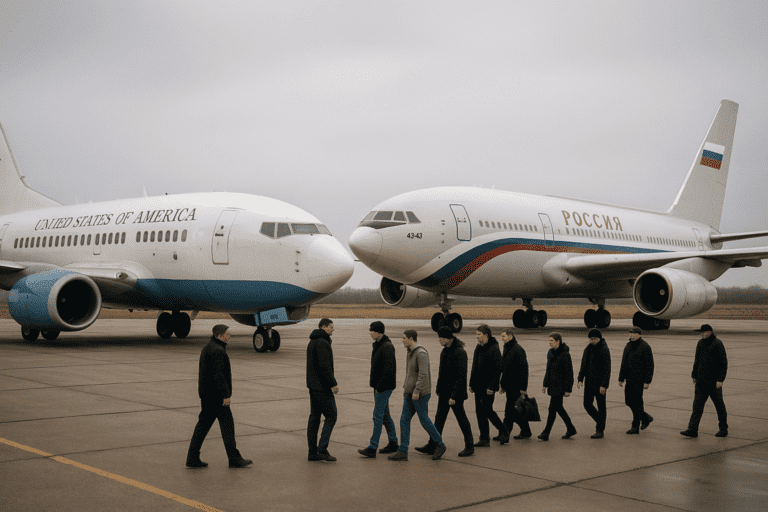On August 1, 2024, the United States and Russia completed a high-profile prisoner exchange, marking a rare moment of cooperation between the two superpowers amid months of strained relations. The exchange, which took place at Ankara Esenboğa Airport in Turkey, involved 26 individuals, including notable Americans such as journalist Evan Gershkovich and former Marine Paul Whelan. Gershkovich had been detained in Russia on charges of espionage, while Whelan had been imprisoned for espionage and alleged misconduct.
This prisoner swap represents a significant diplomatic breakthrough, coming after prolonged and delicate negotiations between Washington and Moscow. The talks aimed at easing the escalating tensions that have defined U.S.-Russia relations, especially in light of the ongoing conflict in Ukraine, cybersecurity threats, and diplomatic expulsions. The success of this exchange has led some to hope that it could be the first step toward a thaw in relations between the two nations.
A Step Toward Diplomatic Cooperation
The release of Gershkovich and Whelan was celebrated by their families, human rights organizations, and international observers as a victory for diplomacy. For their families, the emotional relief was profound, as they had spent months, even years, advocating for their loved ones’ release from what many considered unjust detentions. Human rights groups hailed the exchange as a positive step in addressing the human toll of the ongoing diplomatic standoff, offering a glimpse of hope that such efforts could pave the way for more substantial cooperation between the U.S. and Russia.
However, while the exchange was seen as a sign of diplomatic progress, it has also sparked debate. Critics argue that the deal does not go far enough in addressing the broader geopolitical issues between the two countries. Some fear that this kind of exchange could set a dangerous precedent, where political leverage is gained through the detention of individuals and their eventual release in exchange for other prisoners. These concerns highlight the complexity of using such exchanges as tools in high-stakes diplomatic negotiations, where moral and political considerations often collide.
Continuing Diplomatic Challenges
U.S. Secretary of State Antony Blinken confirmed that the American government remains committed to continuing diplomatic talks with Russia on a wide range of issues, including arms control and the ongoing situation in Ukraine. While the prisoner exchange was seen as a positive sign, Blinken stressed that significant challenges remain unresolved. The conflict in Ukraine, along with cybersecurity concerns, diplomatic expulsions, and differing views on global governance, continues to drive a wedge between the two countries.
Blinken emphasized that while the exchange could signal an opening for further dialogue, it does not address the deeper, long-standing issues that threaten to undermine any long-term stability in U.S.-Russia relations. The upcoming negotiations on issues like nuclear arms control and regional security will require careful diplomacy and a more holistic approach if meaningful progress is to be made.
Global Implications and Long-Term Impact
International observers are keenly watching the long-term effects of this prisoner swap on the broader U.S.-Russia relationship. While the exchange is a positive step in terms of fostering diplomacy and reducing tensions, many experts caution against reading too much into the gesture. The geopolitical standoff between the two nations, especially over the situation in Ukraine and ongoing cybersecurity concerns, continues to be a major source of friction.
The success of the prisoner exchange might offer an opportunity for further diplomatic initiatives, but it will likely take more than a single gesture to resolve the underlying issues that continue to complicate U.S.-Russia relations. Experts stress that this breakthrough should be viewed as a potential starting point for greater cooperation, but it is not a definitive solution to the broader challenges facing both countries.
While this moment of diplomacy serves as a reminder of the potential for cooperation, it also underscores the complexities inherent in U.S.-Russia relations. The key to future stability will lie in sustained efforts to address the enduring issues that divide the two nations. The prisoner swap may be a positive sign, but the road to a lasting resolution will require continued dialogue and a genuine commitment to resolving the broader geopolitical challenges at play.


